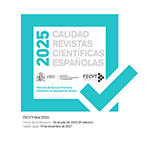Moroccan Law on working and employment conditions of domestic workers: contextualization and content
Abstract
In 2018, Law 19-12 entered into force, establishing the working and employment conditions of domestic workers. The enactment of this law has helped to fill a legal vacuum that affected a particularly feminized and undervalued sector, lacking visibility and social recognition. The main aim of this article is to analyse the content and the impact of this law in the context of the Moroccan labour market. For this purpose, at first it describes the features of domestic work in Morocco and the complex reality of female domestic workers from an intersectional approach that underlines the heterogeneity and vulnerability of this collective. It also pays special attention to the situation of female child workers, the petites bonnes, taking account of the transitional 5- year period of the law that aims to eradicate this scourge. Next, the article focuses on the genesis and the contest of the law and it ends with some conclusions reflecting a brief assessment of its implementation and its deficiencies.
Downloads
Article download
License
In order to support the global exchange of knowledge, the journal Anaquel de Estudios Árabes is allowing unrestricted access to its content as from its publication in this electronic edition, and as such it is an open-access journal. The originals published in this journal are the property of the Complutense University of Madrid and any reproduction thereof in full or in part must cite the source. All content is distributed under a Creative Commons Attribution 4.0 use and distribution licence (CC BY 4.0). This circumstance must be expressly stated in these terms where necessary. You can view the summary and the complete legal text of the licence.










